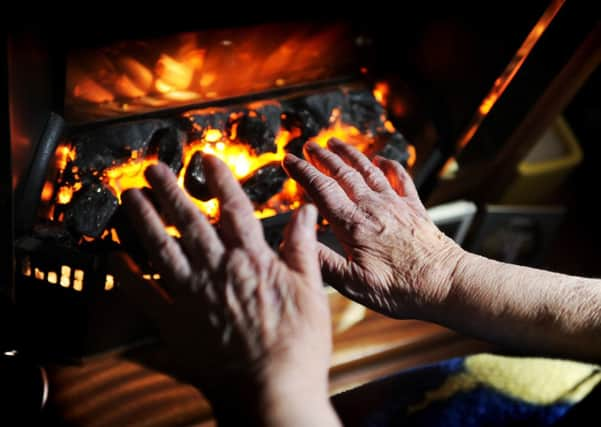Poverty is increasingly blighting region’s rural communities


A quarter of households in some rural areas of the region are living in fuel poverty and coupled with the rising cost of living and cuts to local services, the situation is now critical, the second Rural Lifelines report concludes.
Poverty is exacerbated by a stagnant economy, low rural wages, increased inflation and changes to welfare, and it is leading to social isolation and subsequent health problems because of cuts to public transport and charitable grants to community support services, the report says.
Advertisement
Hide AdAdvertisement
Hide AdAlmost 17 per cent of households in rural areas of the region have no private transport, yet public funding for bus services across Yorkshire has dropped by more than ten per cent in the last two years,
The report’s authors, Involve Yorkshire and Humber, Rural Action Yorkshire, and Humber and Wolds Rural Community Council, say many families who formerly would have been too proud to ask for help, are now doing so but their plight is a hidden problem. The extent of the problem is masked, they say, because of common preconceptions of ‘rural idylls’ and these areas being overwhelmingly ‘well off’.
Leah Swain, chief officer at Rural Action Yorkshire, said: “Public spending funding cuts are impacting on everyone but at Rural Action Yorkshire we see a greater impact in rural areas. This is due to the high cost of service delivery in rural villages making those services vulnerable when money needs to be saved. Then there is the expense of having to travel further to reach remaining services and facilities – and the fact that many vulnerable and elderly rural residents cannot travel and are at increasing risk of isolation and loneliness.
“Heating costs are exacerbating the problem with some people having to choose between food or fuel – nobody should have to make that decision. Many farmers are also still feeling the effects of the bad weather in 2012, meaning they are particularly vulnerable to hardship.”
Advertisement
Hide AdAdvertisement
Hide AdThe Royal Agricultural Benevolent Institution said it is receiving more and more requests for financial support from hard pressed working farmers, with previous bad weather coupled with the rising costs of living leaving many at the brink financially.
According to the Rural Lifelines report, 9.2 per cent of the region’s rural residents are income deprived, 2.6 per cent receive Jobseeker’s Allowance and 17.7 per cent of households are in fuel poverty.
Based on the use of private transport and domestic fuel costs, single working-age adults need to earn at least £15,600 a year in rural towns, £17,900 in villages and £18,600 in hamlets or remote countryside to reach a minimum living standard, compared with £14,400 in urban areas.
Judy Robinson, chief executive of Involve Yorkshire and Humber, says the capacity for voluntary organisations to support those in need is being stretched: “The voluntary and community sector is a lifeline for lonely, isolated and vulnerable people in rural communities, but it is a lifeline that is under threat because of government failure to respond to need.
Advertisement
Hide AdAdvertisement
Hide Ad“The voluntary and community sector (VCS) can deliver very cost effective solutions, for example in tackling loneliness, but services are under threat – often for the sake of a very small amount of investment.”
According to the Rural Lifelines report, the voice of the rural VCS is disappearing as cuts to infrastructure organisations filter through. The Yorkshire and Humber Rural Network closed in July 2013 and few lines of communication between grassroots organisations and government remain.
The report concludes: “There is the danger that, if funding cuts continue, the VCS will become so over-stretched that it will be unable to survive financially and so will disappear. The expertise, networks and care that have been built up over many years is in profound and immediate danger of being lost.”
Huge demand for food among ‘hidden hungry’
More people are being forced to choose between heating and eating, with the hardest hit farming families relying on food banks - many of which are being set up in rural areas for the first time, according to the Rural Lifelines report.
Advertisement
Hide AdAdvertisement
Hide AdPaige Rutherford coordinates a food bank set up in November 2012 at Influence Church in Richmond, North Yorkshire to provide food parcels to families.
She said: “People were constantly coming to the church and asking for help so we set up an official scheme for people to access. Since it started we’ve fed over 1,700 people - that includes people returning to us.
“Everybody has different circumstances but we get a lot of people who receive benefits but for some reason they have been temporarily stopped and they need our support for a few weeks. Some people come because they have lost their jobs and others are trying to get by on low incomes. We have been seeing more people, more regularly.”
The food bank opens every Thursday, 4-6pm, run by 20 volunteers thanks to donations from individuals and local firms.
Advertisement
Hide AdAdvertisement
Hide AdThe Trussell Trust, meanwhile, has 23 food banks in the region. During 2013/14 they provided three days’ emergency food to 28,469 people, up from 9,000 the previous year.
Matt Cameron, the Trust’s regional development officer, said: “Usually clients come to the food bank but in rural areas like Holderness where transport is difficult and costly, 65 per cent of the people helped are unable to get to the food bank so the professionals who referred them to us are coming to the food bank on their behalf and taking the supplies out on their visits.
“The rise in the demand is incredibly concerning. We need constructive talks with policy makers to tackle this situation. The problem is not going to go away without drastic action, especially in Yorkshire where there are a lot of rural communities and hidden hunger. People are going hungry where they don’t have access to services and it’s a wonder how some people are surviving.”